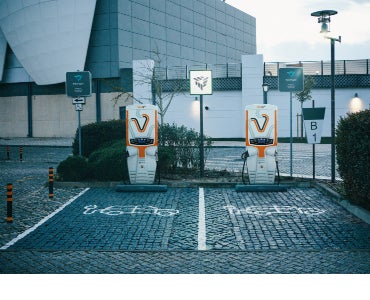Tritium Receives DOE Funding

Tritium receives DOE funding to develop high-powered charging for electric vehicles.
Fast charging pioneer chosen for $3.2 million project with EPRI to scale EV charging infrastructure that connects to the grid.
TORRANCE, Calif., Sept. 11, 2018 — Tritium, the pioneering manufacturer of electric vehicle (EV) high-powered charging solutions, is receiving a portion of $3.2 million in federal funding awarded to the Electric Power Research Institute (EPRI) for developing an extreme fast charging system that can connect to the grid.
EPRI has allocated about $400,000 for Tritium to develop a custom version of its Veefil-PK high-powered charging head, along with providing input for system design and testing.
“This project lets us use our expertise in EV charging to build an advanced system that is easy to scale, repeat and manufacture,” said James Kennedy, Tritium’s engineering director and co-founder. “The solution the project team develops will result in a system with a smaller footprint, higher efficiency and lower cost of ownership.
“We’re looking forward to collaborating with the other partners,” he added. “The project will help us gain exposure to the rapidly developing U.S. market.”
Tritium is one of several companies partnering with EPRI to develop a system for plug-in electric vehicle (PEV) high-powered charging with a DC connection to the medium-voltage grid. The system will reduce the impact on the grid while providing the ability to charge multiple EVs quickly at “extreme” levels while providing physical and cybersecurity protection for the infrastructure. Other major contributors include Eaton Corp., National Renewable Energy Laboratory and Argonne National Laboratory.
“Electrification of transportation presents opportunities for massive decarbonization, increased productivity and customer satisfaction,” said EPRI Vice President of Integrated Grid Mark McGranaghan. “Our collaborative team will dig deeper into options for faster, flexible and more efficient vehicle charging, which could be key to maximizing the impact and acceleration of electrifying fleets of vehicles.”
EPRI’s funding is part of $80 MILLION IN DOE FUNDING distributed among 42 projects for early-stage research in advanced vehicle technologies that give drivers more choices to affordably meet their mobility needs, strengthen U.S. energy security, reduce dependence on foreign materials and enhance the economy.
“Improving the affordability of transportation for American consumers and businesses keeps our economy moving,” said U.S. Secretary of Energy Rick Perry. “By investing in a broad range of technologies, DOE is ensuring America remains at the forefront of innovation.”
The DOE’s investment in battery and electrification research has several objectives, including creating cathode materials for EV batteries that do not require cobalt, providing data on the impact of mobility services and maximizing fuel economy.
***
About Tritium – U.S.
Tritium is a fast-moving technology company specializing in the design and manufacture of DC fast-charging solutions for electric vehicles. Established in Australia in 2001 to provide power-electronic systems and battery energy-storage applications, Tritium launched its first DC fast charger (Veefil-RT) in 2014, and since then it has become a leading global supplier with installations in 24 countries.
The U.S. is one of Tritium’s major markets, and the company opened a sales, R&D and manufacturing facility in Torrance, California, in 2017. Its products are Buy America compliant, and Tritium’s Veefil-RT 50kW fast charger is currently installed on EV charging networks along major routes across the U.S.
In Europe, Tritium holds around 50 percent of the Norwegian market and around 15 percent of the wider European market for 50kW rapid chargers. Customers include Charge.net.nz, EDF Luminus, Fortum, Grønn Kontakt, IONITY, Proterra and Stromnetz.
Tritium’s headquarters and main manufacturing plant are in Australia, and it has an additional facility in Amsterdam, serving the European market.